Kia EV3 VS Toyota RAV4
In a head-to-head comparison, the Kia EV3 impresses with its sleek design and advanced electric powertrain, offering a more modern alternative to the Toyota RAV4's traditional combustion engine options. While the RAV4 maintains its stature as a reliable, versatile SUV with impressive off-road capabilities, the EV3 leads the charge in sustainability and tech-forward features. Ultimately, your choice between these two will hinge on whether you prioritize eco-friendliness and cutting-edge technology or the proven utility and adaptability of the RAV4.
Kia EV3
The Kia EV3 is a testament to innovative design and sustainable driving, featuring a sleek exterior that melds form with function. Inside, the cabin offers a harmonious blend of modern technology and comfort, making every journey enjoyable for both driver and passengers. With its impressive range and eco-friendly credentials, the EV3 positions itself as a competitive player in the evolving landscape of electric vehicles.
detailsToyota RAV4
The Toyota RAV4 stands out in the crowded SUV market with its distinct design, embodying a blend of robustness and style. Its cabin provides a harmonious fusion of comfort and practicality, offering plenty of space for both passengers and luggage. This vehicle is engineered to deliver a smooth driving experience, whether manoeuvring through city streets or exploring winding country roads.
detailsIntroduction: A Clash of Titans
In the ever-evolving landscape of automotive technology, electric vehicles (EVs) and hybrids are taking center stage. This brings us to the head-to-head comparison of two prominent contenders in the SUV category: the all-electric Kia EV3 and the iconic Toyota RAV4, which offers both hybrid and plug-in hybrid options. Both vehicles boast innovative designs, performance capabilities, and cutting-edge technology. In this article, we’ll delve into the technical aspects of each model, highlighting what makes them stand out in their respective fields.
Performance and Powertrain
The Kia EV3 is powered by a fully electric drivetrain that produces up to 204 HP and delivers a robust torque of 283 Nm. It features an automatic transmission with a reduction gearbox and offers a front-wheel drive configuration. With remarkable acceleration capabilities, the EV3 can go from 0 to 100 km/h in as little as 7.5 seconds. Its battery options range from 58.3 kWh to 81.4 kWh, giving it an impressive electric range of up to 605 km, depending on the battery selected and driving conditions.
In contrast, the Toyota RAV4 offers a choice between a full hybrid and a plug-in hybrid system, providing power outputs between 218 HP and 306 HP. Its variable transmission (CVT) ensures smooth acceleration, allowing the RAV4 to accelerate from 0 to 100 km/h in as little as 6 seconds in its sportier configurations. The RAV4's engine capacity is set at 2487 cm³, and with a fuel tank capacity of 55L, it excels in fuel efficiency, consuming as little as 1 L/100 km in hybrid mode.
Efficiency and Sustainability
Both vehicles reflect a commitment to sustainability, but through different means. The Kia EV3 boasts a CO2 efficiency class of A with zero emissions, underscoring its status as a fully electric vehicle. With a consumption rate of 14.9 kWh to 16.2 kWh/100 km, it exemplifies efficiency in the EV segment.
On the other hand, the Toyota RAV4, with a CO2 efficiency class range from D to B, demonstrates the advantages of hybrid technology. Its hybrid variants emit between 126 to 128 g/km, showcasing a balance between performance and environmental responsibility. Although it cannot compete with the EV3’s zero-emissions, the RAV4 delivers an all-electric range of 75 km for its plug-in hybrid model, making it suitable for short commutes and urban driving.
Interior Comfort and Technology
In terms of interior space, the Kia EV3 offers ample room for passengers and cargo with its trunk capacity of 460 liters. Its sleek design includes modern tech features, such as a comprehensive infotainment system that integrates advanced navigation and connectivity options.
The Toyota RAV4, however, takes the lead with a more generous trunk space of up to 580 liters. Its interior is not only spacious but also highly versatile, accommodating various passenger and cargo configurations. Additionally, the RAV4 is equipped with technological advancements, including a comprehensive safety suite, adaptive cruise control, and a user-friendly infotainment system.
Dimensions and Practicality
When comparing dimensions, the Kia EV3 measures approximately 4300 mm in length, 1850 mm in width, and stands at a height of 1560 mm. It comfortably fits five passengers and has a curb weight ranging from 1800 kg to 1885 kg, making it a lightweight option in the electric SUV category.
The Toyota RAV4 is slightly larger, measuring 4600 mm long, 1855 mm wide, and 1685 mm tall. It also has a curb weight between 1745 kg and 1910 kg, depending on the configuration. Both SUVs come with five doors, enhancing their practicality for everyday use and family outings.
Conclusion: Which Should You Choose?
The decision between the Kia EV3 and Toyota RAV4 ultimately boils down to personal preference and intended use. If you are looking for an environmentally friendly vehicle with zero emissions and expansive range, the Kia EV3 shines as a top-tier electric SUV. However, if you prefer the flexibility of hybrid options, ample trunk space, and proven reliability, the Toyota RAV4 is undoubtedly a compelling choice.
Both vehicles showcase the future of automotive innovation, making them worthy contenders in the SUV segment. Each model brings its own set of strengths and innovations, catering to the evolving needs of modern drivers.
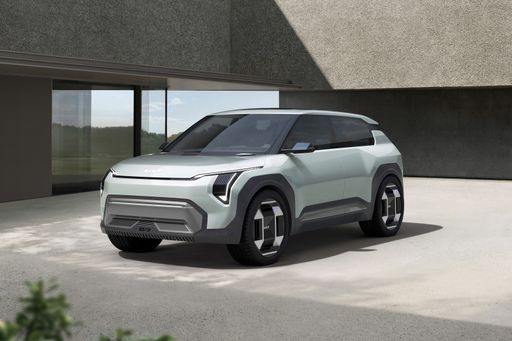 @ kiamedia.com
@ kiamedia.com
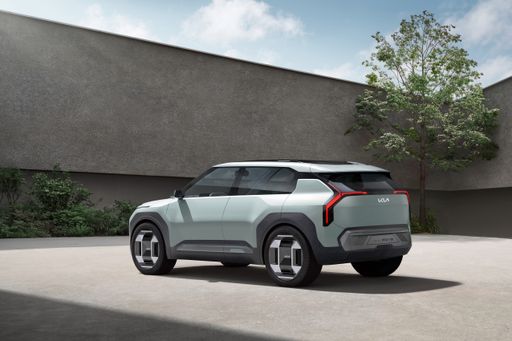 @ kiamedia.com
@ kiamedia.com
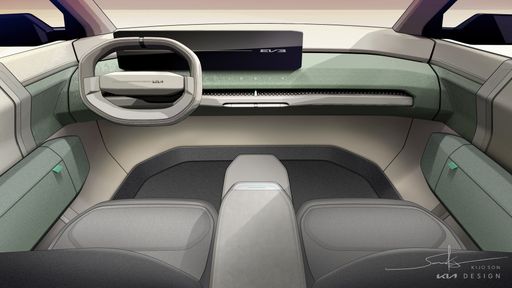 @ kiamedia.com
@ kiamedia.com
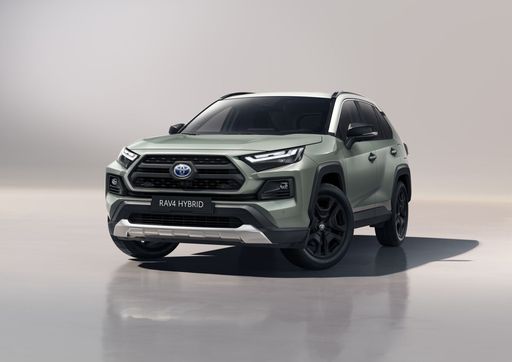 @ Toyota
@ Toyota
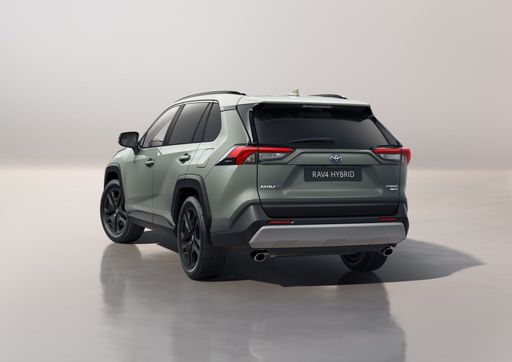 @ Toyota
@ Toyota
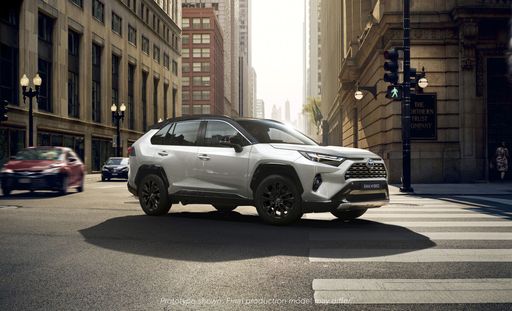 @ Toyota
@ Toyota
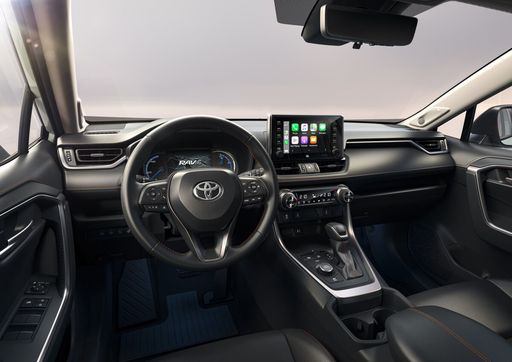 @ Toyota
@ Toyota

|

|
|
|
|
Costs and Consumption |
|
|---|---|
|
Price
about 30800 - 41700
£
|
Price
about 35100 - 50300
£
|
|
Consumption L/100km
-
|
Consumption L/100km
1 - 5.6
L
|
|
Consumption kWh/100km
14.9 - 16.2
kWh
|
Consumption kWh/100km
-
|
|
Electric Range
436 - 605
km
|
Electric Range
75
km
|
|
Battery Capacity
58.3 - 81.4
kWh
|
Battery Capacity
-
|
|
co2
0
g/km
|
co2
22 - 128
g/km
|
|
Fuel tank capacity
-
|
Fuel tank capacity
55
L
|
Dimensions and Body |
|
|
Body Type
SUV
|
Body Type
SUV
|
|
Seats
5
|
Seats
5
|
|
Doors
5
|
Doors
5
|
|
Curb weight
1800 - 1885
kg
|
Curb weight
1745 - 1910
kg
|
|
Trunk capacity
460
L
|
Trunk capacity
520 - 580
L
|
|
Length
4300 - 4310
mm
|
Length
4600
mm
|
|
Width
1850
mm
|
Width
1855
mm
|
|
Height
1560 - 1570
mm
|
Height
1685
mm
|
|
Payload
470
kg
|
Payload
390 - 600
kg
|
Engine and Performance |
|
|
Engine Type
Electric
|
Engine Type
Full Hybrid, Plugin Hybrid
|
|
Transmission
Automatic
|
Transmission
Automatic
|
|
Transmission Detail
Reduction Gearbox
|
Transmission Detail
CVT
|
|
Drive Type
Front-Wheel Drive
|
Drive Type
Front-Wheel Drive, All-Wheel Drive
|
|
Power HP
204
HP
|
Power HP
218 - 306
HP
|
|
Acceleration 0-100km/h
7.5 - 7.9
s
|
Acceleration 0-100km/h
6 - 8.4
s
|
|
Max Speed
170
km/h
|
Max Speed
180
km/h
|
|
Torque
283
Nm
|
Torque
-
|
|
Number of Cylinders
-
|
Number of Cylinders
4
|
|
Power kW
150
kW
|
Power kW
160 - 225
kW
|
|
Engine capacity
-
|
Engine capacity
2487
cm3
|
|
Top speed
170
km/h
|
Top speed
180
km/h
|
General |
|
|
Model Year
2024
|
Model Year
2020 - 2024
|
|
CO2 Efficiency Class
A
|
CO2 Efficiency Class
D, B
|
|
Brand
Kia
|
Brand
Toyota
|
Kia EV3
Introducing the Kia EV3: A New Era in Sustainable Mobility
The automotive world has eagerly awaited the unveiling of Kia's latest electric vehicle – the Kia EV3. An integration of cutting-edge technology and eco-friendly design, the EV3 positions itself as a frontrunner in the electric SUV market. This innovative model is set to redefine driving experiences while maintaining an environmentally conscious footprint. Join us as we delve into the details that make the Kia EV3 a must-consider vehicle for 2024.
Performance and Efficiency: Meeting Modern Demands
The Kia EV3 stands out with its impressive specifications, powered by an electric motor that delivers 204 PS (150 kW) and a robust torque of 283 Nm. This ensures a smooth yet powerful driving experience, with an acceleration from 0-100 km/h achieved in just 7.5 to 7.9 seconds. The EV3's top speed reaches 170 km/h, making it suitable for both urban commutes and highway journeys.
Efficiency remains a highlight, with the EV3 offering a stellar range of 436 to 605 km, made possible by varying battery capacities of 58.3 kWh and 81.4 kWh. With a consumption of 14.9 to 16.2 kWh/100km, the EV3 showcases Kia's commitment to sustainable driving without compromising on performance.
Design and Dimensions: A Blend of Elegance and Practicality
The EV3's design ensures it doesn't go unnoticed on the road. As an SUV, it embodies a contemporary aesthetic complemented by significant dimensions. With a length of 4300 to 4310 mm, a width of 1850 mm, and a height ranging from 1560 to 1570 mm, it offers spacious interior comfort while retaining a sleek exterior profile. The model provides practicalities such as a 460-litre boot capacity, catering to family adventures and everyday needs alike.
Internally, the EV3 seats five passengers comfortably, ensuring ample legroom and advanced amenities across its Air, Earth, and GT-Line trims, delivering varied options for style and convenience.
Technological Innovations: Driving into the Future
Kia has equipped the EV3 with state-of-the-art technologies to enhance driving comfort and safety. Its automatic transmission uses a reduction gearbox for seamless power delivery. The EV3’s suite of driver assistance features, alongside its infotainment system, ensures that each journey is both comfortable and connected.
The Kia EV3 boasts cutting-edge safety features reflective of today’s technological advancements, creating peace of mind as standard for modern drivers.
Environmental Impact: A Conscious Choice
As the world moves towards sustainable transportation, the Kia EV3 positions itself with an impeccable environmental profile. With zero CO2 emissions, it proudly carries an A-rated CO2 efficiency class, setting a benchmark for eco-friendly design.
The transition to an electric drivetrain, supported by Kia's build quality and reliability, ensures that the EV3 is not just a vehicle of the future but a significant step towards a greener planet.
Conclusion: A Compelling Proposition for 2024
The Kia EV3 is more than just an electric vehicle; it represents a blend of innovative tech, commendable performance, and eco-conscious design – all crafted for the modern driver. With a price range of €35,990 to €48,690, the EV3 offers exceptional value for those ready to embrace the future of motoring. As we drive into 2024, the Kia EV3 is undoubtedly a model that stands at the forefront of electric mobility.
Toyota RAV4
The Toyota RAV4: A Modern Marvel in the SUV Segment
The Toyota RAV4 has long been a staple in the SUV market, renowned for its reliable performance and innovative design. In the latest iterations, Toyota continues to build on this legacy by integrating advanced technology and superior engineering.
Hybrid Excellence: Under the Hood
The latest RAV4 models are equipped with impressive hybrid engines, offering both full-hybrid and plug-in hybrid options. The performance spectrum ranges from 218 to a staggering 306 PS, providing power without compromising efficiency. These engines are paired with a responsive CVT automatic transmission, delivering a smooth driving experience.
The hybrid variants achieve remarkable fuel efficiency, with consumption rates as low as 1.0 to 5.6 litres per 100 kilometres, depending on the model. Additionally, the plug-in hybrid versions boast an impressive electric-only range of up to 75 kilometres.
Performance Meets Practicality
The Toyota RAV4 is not just about power; it also offers practical features that enhance the driving experience. With a top speed of up to 180 km/h and a rapid acceleration capability of 0-100 km/h in just 6 to 8.4 seconds, it combines the thrill of driving with everyday usability.
The spacious interior comfortably seats five, with a generous boot capacity ranging from 520 to 580 litres, making it ideal for family adventures or long road trips.
Innovative Driving Dynamics
One of the RAV4's standout features is its driving dynamics. Available in both front-wheel and all-wheel drive, the all-wheel drive variants, branded as AWD-i, offer enhanced traction and stability, providing peace of mind in various driving conditions.
Furthermore, Toyota has ensured that the RAV4 caters to diverse tastes and preferences, with several trim levels like the Adventure AWD-i, Business Edition, and the sporty GR SPORT AWD-i, offering unique features and styling options.
Eco-Friendly and Cost Effective
Environmental considerations are central to the RAV4 design philosophy. The model range adheres to strict CO2 emission standards, rated between 22 and 128 g/km, placing it in the B to D CO2 efficiency classes.
Moreover, the running costs of the RAV4 reflect its excellent efficiency, with monthly expenses ranging from €1,068 to €1,315, and cost per kilometre between 42.7 and 52.6 cents, making it a sensible choice for eco-conscious drivers.
Conclusion: The RAV4's Unmatched Appeal
Whether you're a city driver or an adventure seeker, the Toyota RAV4 offers a perfect blend of power, efficiency, and practicality. Its state-of-the-art hybrid technology, coupled with its versatile features, truly sets it apart in the competitive SUV market. With the Toyota RAV4, drivers experience the best of both worlds: exceptional performance and eco-friendly innovation.
